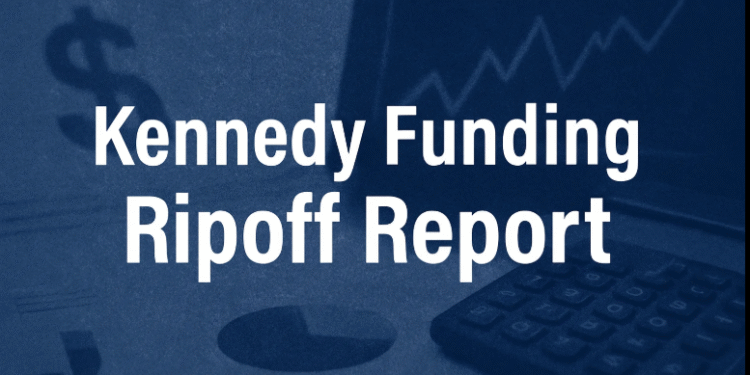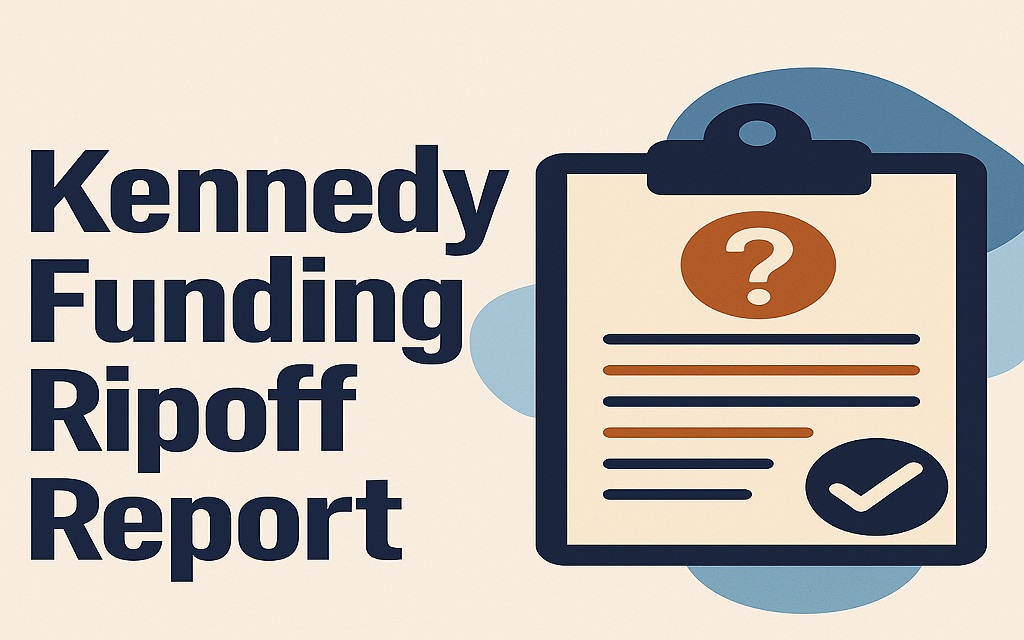Have you ever stumbled across a ripoff report online and wondered whether it reflects the full story? In today’s digital age, a single negative review can spread quickly and shape opinions before facts are fully understood. One name that often pops up in these discussions is Kennedy Funding. People searching for financing solutions sometimes encounter articles or posts labeled as “ripoff reports,” and naturally, they start questioning the credibility of the company. But is there more to the story than what a few posts suggest? Let’s dive deeper, separate myth from reality, and take a closer look at what these reports really mean.
The Rise of Kennedy Funding
To understand why Kennedy Funding has attracted both attention and criticism, we need to start at the beginning. Kennedy Funding Ripoff Report is a direct private lender known for specializing in hard money loans. Unlike traditional banks, which often decline borrowers who don’t fit rigid lending requirements, private lenders like Kennedy Funding step in to offer financing where others hesitate.
This business model made Kennedy Funding stand out. Over the years, the company built a reputation for taking on unconventional projects, including commercial real estate deals, land acquisitions, and situations where borrowers faced tight timelines. Naturally, such a niche approach attracts praise from clients who successfully secured loans, but it also opens the door for criticism from those who didn’t get the outcome they hoped for.
Why Ripoff Reports Appear
So why do ripoff reports surface in the first place? The answer is fairly simple: unmet expectations. Borrowers often approach private lenders with urgent needs. They may be dealing with looming deadlines, stalled projects, or financial challenges. In such situations, emotions run high.
If a loan doesn’t close, or if the terms feel too strict, frustration can easily turn into public complaints. Many ripoff reports online don’t always provide a full picture. Instead, they reflect one side of a story. That doesn’t mean they should be ignored, but it does mean they should be read with caution.
After all, even the most respected companies in the world receive negative reviews. What matters is whether there’s a consistent pattern of unethical behavior or simply isolated cases where expectations didn’t align with reality.
The Nature of Private Lending
To evaluate the credibility of ripoff claims, it’s important to understand how private lending works. Unlike banks, private lenders take on higher risks. They don’t rely as much on credit scores or traditional financial documentation. Instead, they look at the value of the property and the potential of the deal itself.
This flexibility helps many investors move forward when banks say no. However, it also means the terms may involve higher interest rates, upfront fees, or stricter conditions. For some borrowers, these terms can feel overwhelming. But for others, they represent an opportunity to move forward when traditional financing isn’t an option.
When borrowers misunderstand these differences, they may label the lender as unfair or predatory. Yet in reality, private lending is simply a different type of financial service.
A Closer Look at Common Complaints
When browsing ripoff reports about Kennedy Funding, several themes tend to reappear. Let’s break them down:
-
Upfront Fees
Many borrowers complain about fees charged before closing. In the lending world, these fees cover due diligence, legal work, and the cost of assessing a project. While some borrowers feel cheated if their loan doesn’t close, the fees aren’t unique to Kennedy Funding—they are standard across the industry. -
Tough Terms
Some reports mention interest rates or conditions that seem high compared to traditional banks. However, this is the nature of private lending. Higher risk comes with higher costs. Borrowers seeking fast, flexible financing should expect to pay more than they would with conventional loans. -
Deals Falling Through
Another common theme is frustration when deals don’t close. In many cases, this happens because the project didn’t meet underwriting standards. While Kennedy Funding may be flexible, they still need assurance that the loan is secure. Unfortunately, borrowers sometimes interpret a declined deal as a “ripoff.”
Stories of Success
It would be unfair to focus only on negative reports without acknowledging success stories. Many clients have publicly praised Kennedy Funding ripoff report for stepping in when no one else would. Real estate investors in particular often credit the company for helping them secure projects that banks refused to finance.
For example, there are cases where developers needed millions of dollars in just a few weeks to save a property deal. Kennedy Funding managed to step in and provide the capital, allowing the project to move forward. These stories rarely make it into ripoff report platforms, but they are equally important in painting a balanced picture.
How to Read Ripoff Reports with Caution
The internet is full of opinions, and not all of them are reliable. When you read ripoff reports about Kennedy Funding—or any company, for that matter—it’s important to keep a few things in mind:
-
Check the date. Older reports may not reflect the company’s current practices.
-
Look for patterns. One or two negative stories don’t necessarily mean systemic issues.
-
Compare with positive reviews. Every company has both satisfied and unsatisfied clients.
-
Understand the industry. Complaints that a private lender charges higher rates than banks miss the bigger picture.
By approaching ripoff reports critically, you can avoid being swayed by extreme opinions and instead make informed decisions.
Transparency Matters
One area where Kennedy Funding could improve, like many private lenders, is transparency. Borrowers feel more comfortable when terms and conditions are explained upfront in simple language. While contracts and legal documents can be intimidating, clear communication helps build trust.
In fairness, Kennedy Funding does outline its process, but the frustration many clients feel suggests there’s room for more straightforward guidance. Improving transparency not only reduces negative reviews but also ensures clients fully understand what they’re agreeing to before moving forward.
Why Some Borrowers Feel Misled
Despite clear explanations, some borrowers still feel misled. Why does this happen? Often, it’s a mix of desperation and misunderstanding. When a borrower urgently needs financing, they may focus more on the end goal than on the fine print. Later, when they realize the loan isn’t as simple or affordable as they hoped, disappointment sets in.
This doesn’t excuse lenders from being clear, but it highlights the importance of borrowers doing their homework. Private loans are not one-size-fits-all. They work best for certain situations and should always be approached with a full understanding of the risks and rewards.
Comparing Kennedy Funding with Competitors
To put Kennedy Funding in perspective, it helps to compare them with other private lenders. Most competitors operate with similar structures: higher interest rates, upfront fees, and strict property evaluations. What sets Kennedy Funding apart is its size and history. With decades of experience and a global reach, it has more visibility than smaller competitors.
This visibility makes it an easy target for ripoff reports. But it also means Kennedy Funding has the resources and expertise to close large, complex deals that smaller firms might shy away from.
The Role of Online Platforms
Ripoff report platforms have a huge influence on reputation. However, they are not always regulated or verified. Anyone can post a complaint, whether it’s accurate, exaggerated, or even motivated by competition. While these platforms give consumers a voice, they can also create one-sided impressions.
For businesses like Kennedy Funding, this creates a challenge: how do you defend your reputation without silencing legitimate concerns? Many companies choose to focus on improving client experiences rather than chasing down every online complaint. In the long run, consistent positive performance often speaks louder than internet chatter.
What Borrowers Should Do Before Applying
If you’re considering working with Kennedy Funding or any private lender, preparation is key. Here are some tips to avoid misunderstandings:
-
Read the fine print carefully. Don’t skip over the details of fees, rates, and timelines.
-
Ask questions. If something isn’t clear, request a plain explanation.
-
Compare options. Look at multiple lenders before making a decision.
-
Know your numbers. Be realistic about your project’s value and your ability to meet repayment terms.
Taking these steps can help you avoid disappointment and ensure you’re entering a deal with open eyes.
The Bigger Picture
At the end of the day, Kennedy Funding isn’t a scam or a ripoff. It’s a private lending company operating within a unique niche. Like any lender, it has clients who are thrilled with their experience and others who are dissatisfied. What matters is understanding how the business model works and deciding whether it aligns with your needs.
Ripoff reports may highlight frustrations, but they don’t always tell the full story. By weighing both the positives and negatives, borrowers can make smarter choices and avoid falling into the trap of relying solely on one-sided narratives.
Final Thoughts
So, is Kennedy Funding guilty of being a ripoff, or is it simply misunderstood? The truth lies somewhere in the middle. While some borrowers may feel frustrated with fees, terms, or outcomes, others view the company as a lifesaver in tough situations.
As with any financial decision, due diligence is crucial. Borrowers should research thoroughly, read contracts carefully, and consider whether private lending is the right fit for their circumstances.
At the same time, companies like Kennedy Funding can continue to improve transparency and communication, ensuring clients walk away with realistic expectations.
In the end, the Kennedy Funding ripoff report should be seen not as final judgments but as reminders to ask questions, stay informed, and approach lending with clarity. After all, when money is involved, knowledge truly is power.



